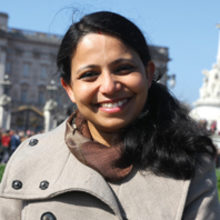Membership Q&A
Issue: Light
11 August 2015 article

This is a regular column to introduce our members. This issue, we’re pleased to introduce Suparna Mitra.
Where are you currently based?
I am a senior research scientist working at both the Norwich Medical School, University of East Anglia and the Institute of Food Research, Norwich Medical Park.
What is your area of specialism?
I specialise in bioinformatics, looking at genomic data analysis and key statistics.
And more specifically?
I focus on metagenomics and metatranscriptomics. I consider different sequencing platforms, microbiota analyses and environmental or host-associated niches.
Tell us about your education to date
My undergraduate studies were in mathematics, then I specialised in statistics and worked as a biostatistician. I completed a PhD in Bioinformatics in 2010, obtaining ’suma cum laude’ for my thesis in comparative metagenomics. I did a postdoc in Germany, moved to the UK to work as a Marie Curie research fellow then on to another research fellowship in Singapore, and now I’m back in the UK.
Where did your interest in microbiology come from?
I am not a microbiologist by education or training but I was amazed by the application of statistics in biology. After I learned to explore the sequences, I was utterly fascinated by how the four-letter nucleotides – A, T, G, C – can change the universe and how, with the help of sequencing, we can try to interpret the changes. It’s like solving a puzzle. Working with different biological projects, especially with medical data, or those with health applications, has nurtured my continued interest in biology.
What are the professional challenges that present themselves and how do you try to overcome them?
I do a lot of data analysis and I think knowledge of the biology in question helps you better understand the data for respective projects. Thus, I feel I am lacking some of the depth of understanding in some scenarios. I also didn’t learn computer programming as part of my earlier education. Both of these make my work more challenging. I try to further my knowledge and learn as much as I can. Discussion with colleagues/students/friends is always useful. Every time I feel richer after considering further thoughts and ideas. My words are limited to express my gratitude to all the people who have helped me in my work/learning over the years.
What is the best part about ‘doing science’?
I like exploring. Doing science allows me that pleasure. Earning money for the necessities in life is possible with any job but science opens up a new world besides just earning a living. The satisfaction of searching for something new, and the happiness of being useful for a greater cause is why I enjoy doing science. Alongside that, is the chance to employ the liberty of thought.
Who is your role model?
This is a hard question. The first people to come to mind are my parents for their views on life. But more specifically, if I think about science, I would say Marie Curie. She is a fascinating woman and I wish I could have met her in person. She was so devoted to science. If I need to choose someone in science that I know personally, then it is my PhD supervisor, Professor Daniel Huson. I admire him for his enthusiastic view of science, his thorough knowledge of his work and his view of life. He is also a friend, philosopher and guide whom I can trust.
What do you do to relax?
I enjoy art, gardening, reading books and spending time with my family.
What one record and luxury item would you take to a desert island?
First of all, it would be hard for me to be alone on a desert island without anyone. But if I do need to be, I would like to hear light, soothing music, but I am not very particular about one record. So any soothing music will be good for me. Similarly, I like to live a modest life; just a couple of books and some colours would be great!
Tell us one thing that your work colleagues won’t know about you!
They know the professional ‘me’. I guess they don’t know the artistic ‘me’. I can spend hours doing something creative, such as art or sculpture. I even forget to eat!
If you weren’t a scientist, what would you be?
An artist or a travel photographer.
If you would like to be featured in this section or know someone who may, contact Paul Easton, Head of Membership Services, at [email protected]
